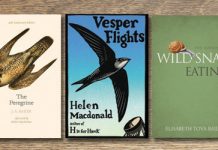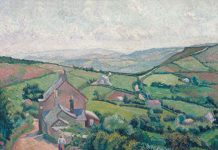Painter Jan Walker’s first major show opens at Sladers Yard in West Bay on 12 April. Now that the paintings are ready and the catalogues are printing, she takes a look back to see how she reached this point.
Seven years ago, she was selected by the internationally acclaimed abstract impressionist painter John Hubbard as a winner for the 2008 Marshwood Arts Awards. “I had the privilege and excitement of meeting John Hubbard for the first time when he visited my studio to select the paintings for the exhibition at the Bridport Arts Centre. He was very charming and encouraging and, best of all, he liked my work. I had just left teaching in order to paint full time. His recognition was extraordinarily helpful at that time. To see my work hanging alongside his and other internationally distinguished artists’ work, and seeming to hold its own, validated everything I was trying to do.’
Five years on, for the second Marshwood Arts Awards in 2013, John Hubbard selected her again. Her confidence had grown somewhat both through her own excitement with the results she was beginning to produce, and through the positive response from the public who have bought and followed her work from the start. Her Dorset Art Weeks shows alongside her husband, the potter David Walker, at their house and studio in Weymouth had sold wonderfully well, as had exhibitions in several local galleries. She was in discussion with Sladers Yard about plans to show there. ‘I realized that my painting had developed from studying stones in strata to really grappling with the beauty and power of this ancient Dorset coastline.’
Jan is completely engrossed by her work, infectiously enthusiastic about the surfaces and paint effects in parts of her paintings and about the rocks that have inspired them. Much of the new show is based on Portland’s rock faces, the geology exposed to sea, wind and exceptional island light. ‘When I paint I am intensely aware of the time held in the rocks and the ongoing weathering and wearing processes which expose and re-define the forms and surfaces.’
Her passionate interest had its beginnings much earlier on. Her father was a geography teacher with special expertise in geomorphology. As a child she learned from him how to read the history in rocks and to be aware of the vast periods of time, the life forms accreting on the floors of ancient semi-tropical seas and the tremendous forces of pressure that combine to form the rocks we see today. The faces of cliffs tell the stories of time for her.
As an artist, seeing and interpreting are just the first part of the process for Jan Walker. Again her interest in pattern, texture and surface and her astonishing ability to create them can be traced back. Jan’s grandfather and great-grandfather were marblers. They used paint effects to create all different sorts of marble, wood and different natural materials in cathedrals and restoration projects. Jan remembers being fascinated by the bathroom at her grandfather’s home which looked as if it was built from slabs of marble with different coloured inlays. His workbox was full of all kinds of feathered brushes and implements for working with the paint just as hers is today in a different way.
Jan studied ceramics and fine art at teacher training college and loved teaching. She was Head of Art for long periods of time in three different schools. After college, she and David moved to the Fens where she worked as a teacher and made works of art with batik. Throughout the early eighties she showed in Cambridge and at Blackheath Gallery, London, had a number of solo shows in Ely and a triumphant sellout solo exhibition in Harvey Nichols, London of twenty-five pieces, some very large, in 1983.
Living self-sufficiently with two small boys and teaching art fulltime, Jan never stopped drawing, painting and making, but her exhibitions ceased for twenty-five years before 2008.
Since 1985 she and David have lived in Weymouth on the Dorset coast and have enjoyed many trips to the wild coast of Galicia in North West Spain. No wonder then that she has powered back into painting with a deep commitment since she has been able to give it her full attention.
Jan’s painting technique echoes the processes of time and weathering. She applies her paint in layers, then cuts back through the layers to expose earlier elements. Enjoying the physicality of the paint, she sometimes works on wood panels as well as canvas, which allows her to gouge, scrape and erode deep into the surface. This gives a weightiness to the painting as awe-inspiring as the rock itself. Yet these are not literal pictures of cliffs. Just as fiction can be more true in a way than fact, so Jan Walker’s accumulated knowledge and love of her subject matter comes across more powerfully through her abstracted works of art.
Jan Walker’s rock faces are neither obdurate nor unyielding. Scoured and scored by the passage of time, they shine with lustrous radiant light. The coruscated surfaces she creates are vibrant with colour and texture like silk. Parts are fine and lacy, pale and silvery, others deeply shadowed, blue with water sometimes running other times submerged. Yet these are paint effects and illusion. They communicate so directly it is hard to remember that rocks don’t look like this. Water in the rocks would not be this azure blue. Yet it works, something in the cleanness and hard authenticity of her work is deeply attractive and compelling.
For an ambitious artist—one who is pushing to do more than produce good local views—the Marshwood Arts Awards offer recognition not from critics or curators but from serious established artists. Now that Jan Walker is ready to make the move from good local artist to showing in a widely recognized gallery such as Sladers Yard, who else should write the foreword to her catalogue but John Hubbard who spotted her at the beginning? ‘I was lucky enough to enjoy an afternoon at his gallery and studio where we discussed the act of painting and its endless properties as an aspect of the obsessional process of painting.’
Jan Walker will be showing in ‘Earth and Rock’ with Frances Hatch, furniture maker Petter Southall and ceramic artist Robin Welch at Sladers Yard, West Bay, from April 12 to May 31. She and Frances Hatch will give an artist’s talk in May. Details and exhibition can be viewed online at www.sladersyard.co.uk.









